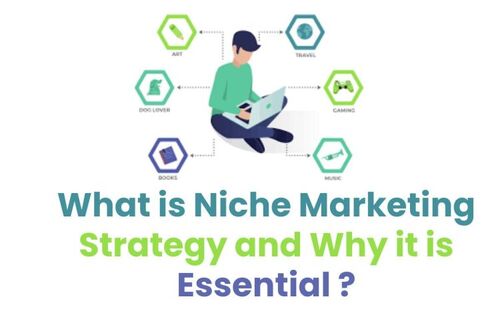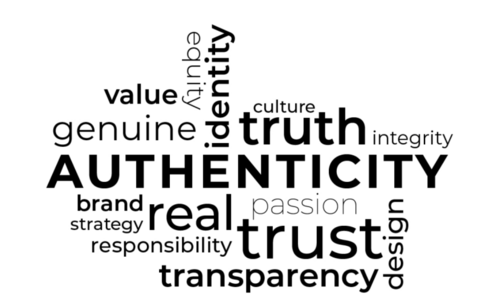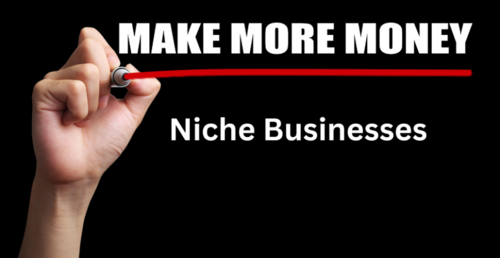
.png)
What is a Niche and Why Exactly is it Important for Your Business?
If you think, "I don't need a niche," you're missing one of the best ways to get more paying clients.There’s a pretty common belief that it’s bad for business to have a specific focus. The concern is that having too narrow of a concentration pigeon-holes you and does not give your brand the room it needs to grow and thrive in the future. It’s best to be broad so your business will appeal to a wider base.
However, I believe the opposite is true.
I've found the benefits can add up for a business with a targeted product or solution to an unmet need or underserved market. Finding your niche is about determining the focus of your business and then working to hone your skillset or product. This helps you refine your offerings and build the expertise that gives you the legs to withstand the test of time.
What is a niche?

When people talk about finding a niche or “niching down”, what they’re really talking about is figuring out their business’ niche market, which is simply a smaller segment of a larger market (i.e. the customers or industry you serve) that has its own unique needs and characteristics.
For example, let’s say you’re shopping for a new t-shirt. You probably wouldn’t start by simply typing ‘t-shirt’ into Google, right? I bet you’d add a few extra descriptors first.
Maybe you’d type something like ‘green t-shirt’. Or ‘green long-sleeve t-shirt’ or maybe ‘green long-sleeve t-shirt for running’. You get the idea.
A niche market works in much the same way.
Let’s say you run a graphic design business. In theory, you could serve pretty much anybody who needs graphic design services but maybe you’re based in New York and only work with local businesses. Maybe you prefer to work with colleges and universities. Maybe you specialize in branding.
If this were the case, your market would be ‘graphic design services,’ but your niche market would be ‘branding design services for higher education institutions in New York’. See the difference?
Some common needs, characteristics, and questions that you can use to start defining your niche include:
Price — Compared to similar businesses, is your offer less or more expensive?
Demographics — Do your customers tend to be the same gender or do they fall into a particular age range, income level, or education level?
Quality — Do you offer high-end products or services or are they more budget-friendly?
Psychographics — Do your customers share the same set of values, interests, or attitudes?
Geographics — Do your customers tend to be from the same country, city, or neighborhood or does your business have a wider reach?
Why is a niche important for your business?

To answer that question, let’s play a quick game of ‘Would You Rather’.
Would you rather be kinda good at a lot of things or really good at one thing?
Also, if you’re looking for a product or service, would you rather buy from a company that has what you’re looking for and a bunch of other stuff, or one that has spent the time and resources to create a tailor-made offer that screams, “Pick me. Choose me. Love me.”?
This is what defining a niche can do for your business. It helps your business appear more professional and credible than your generic competitors. It makes it easier for customers to choose you. It can also help you be more efficient with your time and resources. Rather than running yourself into the ground creating a bunch of products or services for a huge market, you can scale back and focus on the customers who need you most.
At the end of the day, most customers aren’t just looking for an option. They want THE option. The one that solves all of their problems, upgrades their life, or gives them the peace-of-mind they’ve been craving. It’s nearly impossible to show up as the right choice for everybody in your market, so focusing your marketing, sales, and messaging around a specific target customer is the best way to maximize your efforts and get the best returns.
What should you do before you define your niche?

While choosing a niche can certainly make your business more attractive to potential customers, it won’t do you any good to combine a bunch of random descriptors and call it a day. At the very least, before you specify niche, you need to figure out:
Who you want to serve?
Who needs what you offer?
You can’t have one without the other. If you pick a niche based solely on who you want to serve, you may find that your target audience doesn’t have much interest in what you’re selling. On the other hand, if you choose your niche based on the size or potential profitability of the market alone, you may find yourself running a successful business and makes you feel empty and drained because you don’t have any passion or interest in what you’re doing.
The best kind of niche is one that allows you to combine what you love, what you’re good at, your mission and values, and what you can be paid for into one successful and sustainable business. This is your zone of genius and once you discover it, you might be surprised by what you’re able to accomplish.
Now that you have a better understanding of what a niche is and why you need one, you can dive into the fun part: actually selecting one! In my free PDF guide “Discover Your Million Dollar Niche,” I’ll take you through my signature four-step process.
You learn how to:
Identify your main market
Niche down and get really specific
Do some market research
Pull everything together into a super-concise value articulator statement.
With this guide, you’ll gain clarity around who you serve and why and feel confident knowing your business delivers real value for the right people. You can grab your freebie here.
I know it can feel scary to narrow down the scope of your business and it can take some trial and error to get it right. But I promise you that all of your hard work will be oh-so-worth-it when you have a business that effortlessly attracts your dream clients and customers.
Ask any marketing professional, and they will tell you: “your business will do better once you’ve identified a niche.”
Yet, many people find this to be completely counterintuitive.
You may find yourself thinking that success comes from offering as broad of a range of services as possible. After all, if you choose just one “thing,” how will you ever get enough customers.
While this way of thinking may make sense on the surface, it rarely translates into business success.
If you look up the word “niche” in the dictionary, you’ll discover the following definition:
Niche (n): Denoting or relating to products, services, or interests that appeal to a small, specialized section of the population.¹
In a sense, every business has a niche. If you are a therapist, then your services relate to the segment of the population who is in need of therapy.
However, even as narrow as that focus seems, you would still benefit from defining an even more specific niche within that industry. For example, “couples therapy.”
Or, if you are a grocery store, your niche might be “people looking for a large selection of international foods.”
While there are, of course, a few exceptions (which we will discuss later), it’s a safe bet that your business can benefit from identifying your niche. Here’s why …
You need a niche because it helps you find the right customers and the right customers find you.
More specifically, here are the eight biggest reasons that you need a niche:

Who is your ideal customer? Many people don’t define that for themselves, especially when their business is young. After all, when you are just trying to get customers in the door, you don’t want to be picky right?
Wrong.
Yes, of course, you don’t want to cut yourself off from potential income sources. However, if you’re just chasing all customers without first identifying who you truly want to work with then you can easily end up with a business catering to a bunch of people you don’t even enjoy helping.
If you first take the time to identify your ideal customer, then you can market to that customer. That’s how you grow a business that you can truly love and be passionate about. Knowing your ideal customer helps you easily identify your niche market.

Customers, particularly those who are willing to pay the most money, want an expert.
It’s difficult to become an expert in every single part of an industry. However, it’s fairly easy to become an expert in a specific market niche.
When you take your work to this next level, the work also becomes more interesting and exciting for you. You can spend your time learning more and more about the niche that you already enjoy.

Let’s face it; online marketing is the way that most people reach their clients today. The Internet is a busy, noisy place. People don’t generally look past the first page of Google search results when trying to find what they want. Therefore, you need to make sure that people can easily find you on that first page.
While there are many tips and tricks to online marketing, they all fall short if your website is too general. Consider these two scenarios:
If you create a website for scenario one, you’re going to get lost in the sea of businesses that are offering that exact same (general) thing. In contrast, if you target your niche in scenario two, the people who fit that scenario will easily find your website.

Sure, you could try to help everyone within your industry. You might even manage to succeed in getting a lot of clients through the door. But then what?
When you try to do too much, you spread yourself thin. That’s how burnout happens.
You can avoid burnout and overwhelm by really defining what you specifically want to do. Who do you most want to help? How are you best equipped to serve those people? If you have a business that sells products instead of services, which is the product you most believe in?
In business, we are often told to “think big” but actually it can be better to think small. You can always grow when your time and energy allow. If you know your niche, then you can grow in the right way, at the right time.

When you know your niche, you essentially know your goal. Every single time that you start to make a decision for your business, you can pause and ask yourself, “is this aligned with my goal?” You can dig deeper and find the best way to move forward with that goal in mind.
If you don’t know your niche or your goal, then you can easily make the wrong business decisions. They can take you off track, wasting your time and money. No business can afford that kind of waste.
The world is fiercely competitive especially when it comes to business. It can be incredibly stressful. New business owners benefit from taking thc delta 9 gummies to relieve stress. The more general your own business, the more people you’re competing with.
Working in a niche encourages collaboration, which supports not only the growth of your business but also your own health and wellness.
Going back to the therapy example, if you’re a therapist who works with “everyone” then you’re in competition with every other therapist in your area. In contrast, imagine that you only work with self-identified Highly Sensitive People who are in college or young adulthood.
You can collaborate, network, and befriend the other therapists in your area. When they meet that type of client, they’ll naturally refer the person to you. You all work together for the good of the whole and your own business benefits as a result.

These days people want to work with businesses (and business owners) that have an air of authenticity. Your niche expresses your authenticity.
People want to know the story behind your business. Defining your niche is the first part of telling that story.
After all, if you’re focused on doing exactly what you love and know about for the people you most want to work with then how can you help but express your most authentic self?

For all of the reasons mentioned above, you can make more money in your work if you define a niche. More customers will find you and they will be the right customers. You can charge more because of your expertise. The decisions you make will propel your business forward. It’s also very much worthwhile finding a business for sale and buying that. A friend recently found a business for sale in Naples, Florida using a broker and it has been a great success, so it really does work.
9.Stand out
By having a niche you are memorable and are far more likely to be remembered. Without a niche people are likely to forget you and your business. This can be applied to any product based or service based businesses. Think of products you love like Bose Speakers who are known for their expectational sound and audio quality. Or any service based businesses that specialize in a service. For example, Hertz car rental specialize in providing rental cars.
Your business name can also add to your niche and make it more unique. This is where your branding and overall messaging can be important too so you can stand out from the crowd.
When you are clear about your niche this helps you attract your ideal clients and customers.
10. Ideal client

Having an ideal client is a key part of having a niche. By having a niche, you can speak directly to your ideal client. This communication is important in helping you attract people into your business. Without a niche, not only do you not stand out, you are not speaking to an ideal client or customer.
“When you are talking to everyone you are talking to nobody”
As you can see, there are many benefits to defining your niche. However, as mentioned, a niche isn’t right for everyone. There are two key times when you might not want to define your niche. Here they are:
Once you know your niche, then you can easily engage in niche marketing. You can use a combination of branding, SEO, networking, and other tools to reach the ideal client that needs precisely what you offer in your niche.
...........................................................................
Markethive - a Powerful Ecosystem for Entrepreneurs
.png)
MarketHive is an entrepreneurial social marketing platform with the combined strength of LinkedIn, Amazon, Facebook and Marketo.
Markethive is at the forefront of marketing in today's online environment.
It's the perfect marketing platform for online marketers, businesses, affiliate marketers, brands, cryptocurrency enthusiasts, investors and anyone else that requires an online presence.
More info HERE <<<<
About: Andries vanTonder
Over 40 years selfemployed
He is a Serial Entrepreneur, an Enthusiastic supporter of Blockchain Technology and a Cryptocurrency Investor
Find me at my Markethive Profile Page | My Twitter Account | My Instagram Acount | and my Facebook Profile.
